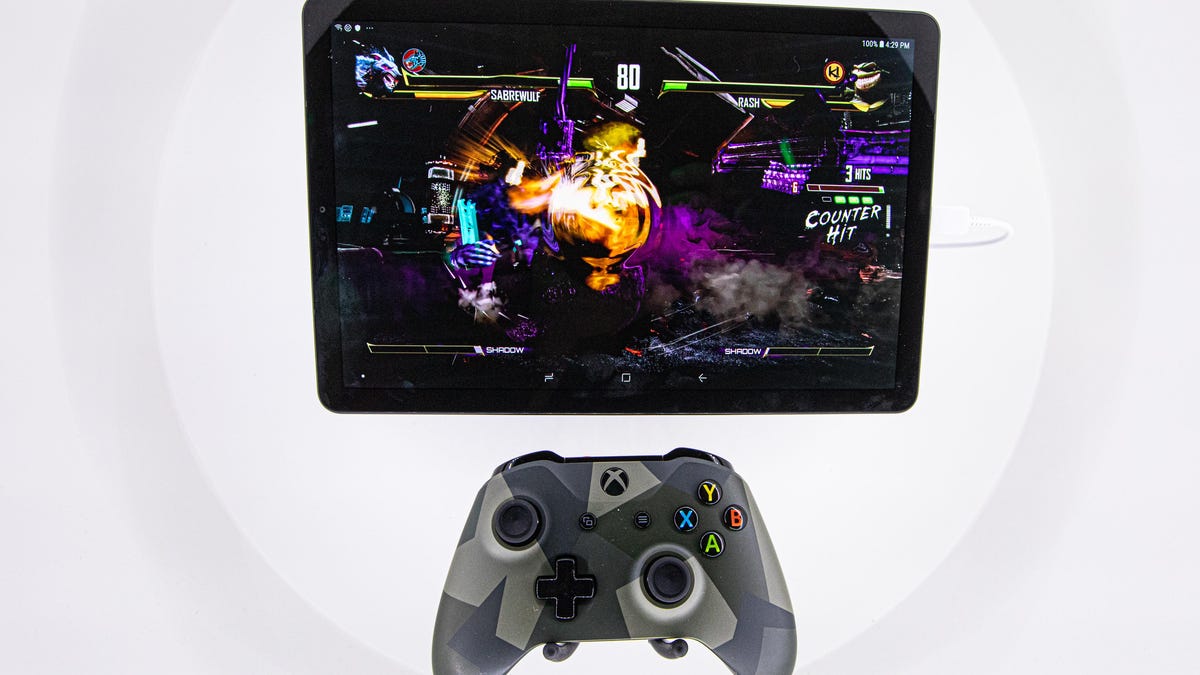Xbox slams Apple for blocking Microsoft's Project xCloud streaming game service
The tech giant said in a statement that Apple is "alone" as the only general purpose platform denying access to its service.

It's a good thing a new Halo game is coming out, because Microsoft's about to go to war.
Earlier this week, when Microsoft announced its Project xCloud video game service would be released on September 15 for free to Xbox Games Pass Ultimate subscribers, it said devices powered by Google's Android software were supported. But the tech giant conspicuously said nothing about Apple in its press materials. On Thursday, it said why.
In a strongly worded statement, the tech giant said Apple was blocking its efforts to bring its streaming game service to iPhone and iPad users.
"Apple stands alone as the only general purpose platform to deny consumers from cloud gaming and game subscription services like Xbox Game Pass," the company said. "Unfortunately, we do not have a path to bring our vision of cloud gaming with Xbox Game Pass Ultimate to gamers on iOS via the Apple App Store."
Apple earlier Thursday said in a statement it doesn't allow streaming game apps like Microsoft's xCloud service because they don't follow the company's guidelines, "including submitting games individually for review and appearing in charts and search."
The tussle between the companies comes as Microsoft is preparing to publicly release its game streaming service, previously called Project xCloud, marking its first step toward offering games to players without the need for a PC or video game console. The technology, which effectively allows people to play video games on a computer server far from their home in a similar way they stream movies from Netflix today, has long been discussed as the inevitable future of playing visually intricate and complexly designed video games.
Many industry insiders see Microsoft's move to actually offering the technology, and for free to people paying up to $15 per month Xbox Games Pass Ultimate subscription service, as a milestone in that eventual transition. Microsoft's subscription, which launched last year, includes access to the company's Xbox Live social gaming network and access to a library of more than 100 games including its Minecraft Dungeons adventure game, Gears 5 space-age war title and Bungie's Destiny 2 sci-fi shooting game.
Apple has said its iPhones can compete with video game consoles, and often highlights popularity of gaming on its smartphones.
"Customers have more freedom of choice now in how they consume content and how they spend their entertainment dollars than ever before," Microsoft's Xbox head Phil Spencer said in an interview last month. "They view this world of selling one piece of hardware that's a closed ecosystem as a kind of a relic of the past."
Microsoft's now public disagreement with Apple not only slows Microsoft's efforts to offer this new technology to gamers used to streaming music, movies and TV shows. It also highlights Apple's contentious relationship with developers, some of whom increasingly complain that Apple is too inflexible in how it manages its App Store.
For its part, Apple's argued its approach is fair. Among other things, the iPhone maker commissioned a study published in July that showed its commissions of up to 30% for paid apps and subscriptions in its app store are mostly similar to its peers.
At the same time, governments around the world have been questioning whether the way Apple wields its power potentially shuts out rivals. The European Union has opened two investigations into how Apple treats outside developers. Apple also hasn't made key popular technology, like the iMessage encrypted chat service, available to phones powered by Google's Android software.
Microsoft xCloud isn't the only gaming service without access to its games on the App Store. Google's Stadia game streaming service as well doesn't have an iOS app for the iPhone and iPad. And Facebook on Friday launched its Facebook Gaming marketplace app without access to any actual games.
"Unfortunately, we had to remove gameplay functionality entirely in order to get Apple's approval on the standalone Facebook Gaming app," Sheryl Sandberg, Facebook's chief operating officer, said in an emailed statement. "We're staying focused on building communities for the more than 380 million people who play games on Facebook every month -- whether Apple allows it in a standalone app or not."
Apple's tussles
Apple's public spillover of its disagreement with Microsoft over the xCloud streaming service is the latest in a series of spats the company's had with app makers.
Most recently, some app developers and Apple watchers criticized the company for denying a paid email app, Hey, from productivity company Basecamp from its App Store.
Basecamp at the time tweeted that updates for its app had been rejected multiple times, apparently because it didn't offer an in-app purchase for the full $99-a-year service. The two companies came to a truce when Basecamp offered a free trial in its app instead.
During the episode, Microsoft president Brad Smith said Apple's fees and policies stifled competition more than Microsoft's own behavior in the 1990s that led a judge to rule the company a monopoly.
Following the episode, Apple announced it would allow developers to challenge its App Store guidelines and policies starting sometime this summer.
Microsoft said Thursday that it's "committed" to finding a way to bring the service to iPhones and iPads, though it didn't say how that may happen.
"We believe that the customer should be at the heart of the gaming experience and gamers tell us they want to play, connect and share anywhere, no matter where they are," Microsoft added.

